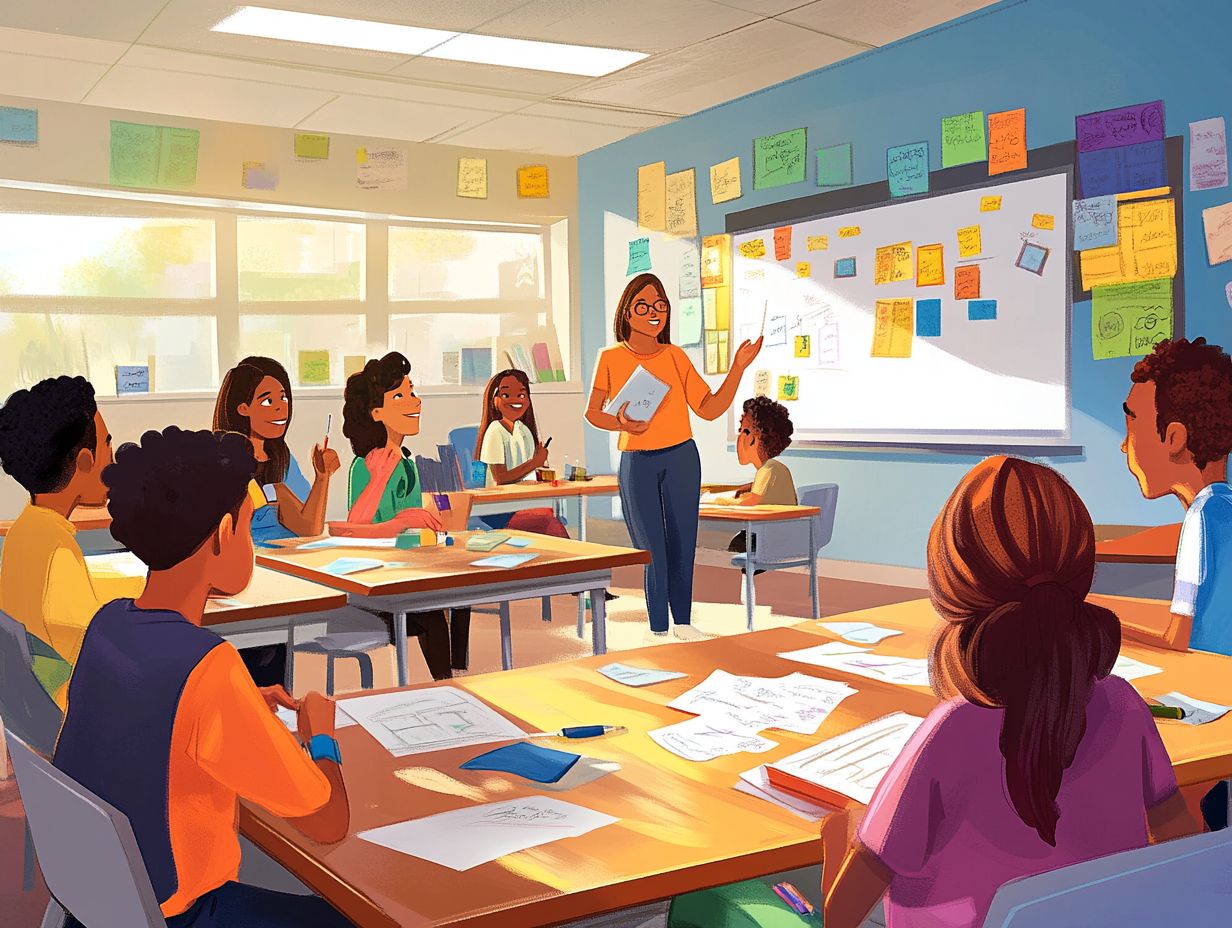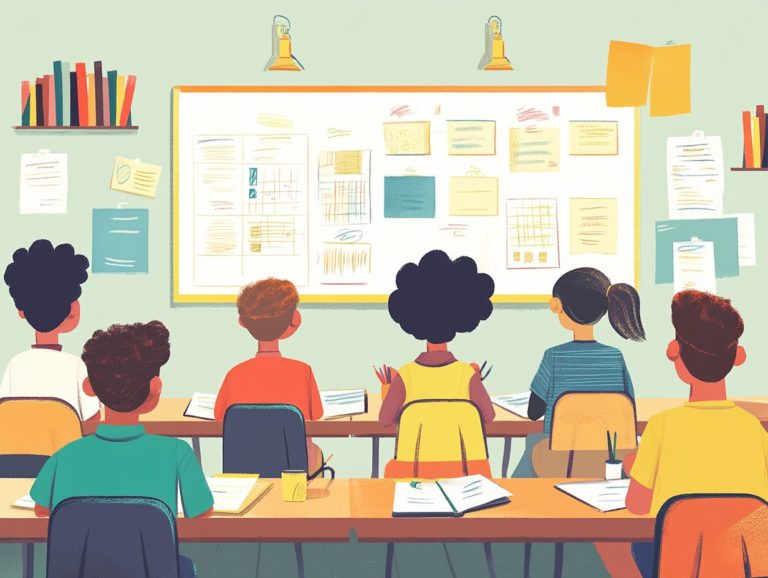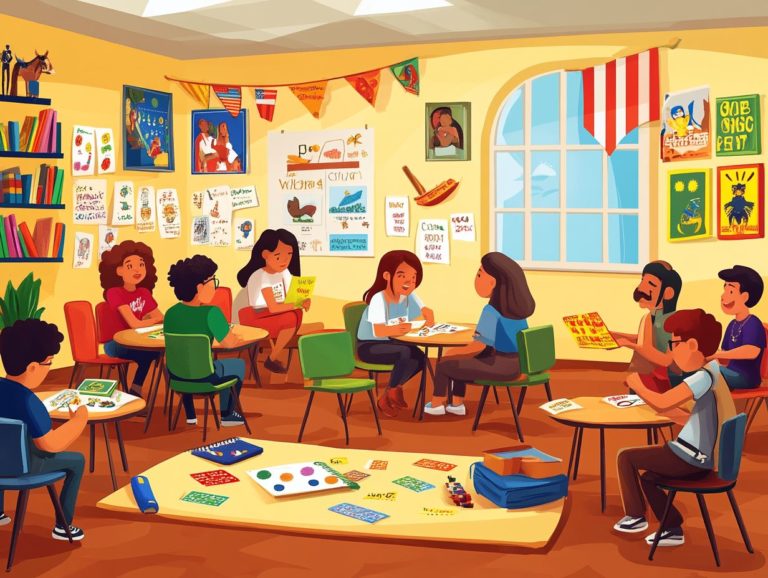What to Expect in Your First Language Class
Embarking on your first language class can stir a mix of excitement and nerves. You might find yourself pondering what materials you’ll need, how the class will be structured, and the best ways to interact with your teacher and classmates.
This article will walk you through everything you can anticipate in your initial session, from class activities to the common challenges you may encounter. You will also discover tips to maximize your learning experience and resources designed to propel your language journey forward.
Dive into this guide, and get ready to feel energized and confident for your exciting new adventure!
Contents
- Key Takeaways:
- Preparing for Your First Language Class
- What to Expect in Class
- Common Challenges in Language Learning
- Maximizing Your Learning in Class
- Continuing Your Language Learning Journey
- Frequently Asked Questions
- What can I expect in my first language class?
- Do I need any prior knowledge of the language before starting the class?
- Will I be able to have conversations in the language after my first class?
- What teaching methods will be used in the class?
- Will I receive any materials or textbooks for the class?
- What if I have trouble understanding or keeping up in class?
Key Takeaways:

- Prepare necessary materials and study tips to maximize your first language class.
- Expect a structured class with interactive activities and chances to engage with your teacher and classmates.
- Overcome challenges with effective strategies and resources to continue your learning journey.
Preparing for Your First Language Class
Preparing for your first language class is an essential step toward realizing your language goals. Approach the classroom with enthusiasm and a sense of comfort; this will greatly enhance your interactions with both the teacher and your fellow students.
Whether you’re diving into Japanese, English, or any other language, grasping cultural nuances can enhance your engagement. Understanding fundamental concepts of communication will also help.
Take advantage of the resources offered by institutions like the American English Institute and the College of Staten Island to elevate your learning experience.
Materials and Study Tips
Gathering the right materials and using effective study tips can significantly enhance your language learning experience. In this journey, accessing a variety of resources is essential.
Textbooks often lay the groundwork for understanding grammar and vocabulary. Digital resources, like language apps and online courses, provide interactive avenues for practice. Having organized note-taking tools, whether digital notebooks or traditional binders, is key for cataloging new words and phrases.
To truly master a language, adopt strategies such as:
- Creating flashcards for vocabulary retention.
- Engaging in writing exercises to refine your composition skills.
Regularly practicing conversations with native speakers or joining language exchange groups can further solidify your knowledge, making the entire learning process both enjoyable and effective.
What to Expect in Class
Understanding what to expect in your language class is crucial for maximizing your participation and interaction within the learning environment. These classes are crafted to be immersive, focusing on essential skills such as comprehension, pronunciation, and practical vocabulary usage in languages like Japanese, English, German, or Spanish.
You can look forward to a dynamic blend of structured lessons, cultural insights, and opportunities for growth, all designed to help you reach your language learning aspirations.
Class Structure and Activities

The structure of a language class is designed to captivate you, featuring a variety of lessons and activities that facilitate your journey toward language acquisition.
These components typically include:
- Vocabulary drills help you build a strong word bank and understand context.
- Pronunciation practice boosts your confidence and enhances effective communication.
- Immersion techniques, such as interacting with authentic materials, allow you to experience the language in real-world situations.
By incorporating diverse activities, the class promotes hands-on learning and encourages cultural expression. You will not only develop linguistic skills but also cultivate an appreciation for the rich culture the language embodies.
Interacting with the Teacher and Classmates
Interacting with your teacher and classmates is essential for your language learning journey. It offers crucial support and invaluable feedback.
When you engage in the classroom, you create an environment ripe for growth. Your communication skills can flourish as you encourage yourself and others to ask questions.
Asking questions not only clarifies understanding but also ignites meaningful discussions, building a supportive community.
Giving valuable feedback to your classmates and teachers boosts everyone s learning and sharpens your critical thinking skills.
Actively participating in group discussions builds your confidence. You ll articulate your ideas and viewpoints with ease, nurturing a sense of community essential for mastering a new language.
Common Challenges in Language Learning
Language learning often comes with its share of challenges. You may struggle with mastering pronunciation or complex grammar concepts.
These obstacles can hinder your comprehension and shake your confidence. However, by managing your expectations and using effective techniques, you can alleviate these hurdles.
This makes the learning journey not only smoother but also more enjoyable, regardless of your proficiency level.
Tips for Overcoming Difficulties
Overcoming language learning challenges calls for effective strategies and consistent practice. Explore exciting language learning tools that can transform your experience!
Resources like user-friendly apps and immersive online courses offer structured pathways and interactive content. They make studying engaging.
Seek constructive feedback from peers or language tutors to identify areas needing improvement while reinforcing your skills.
Practice self-introduction techniques to boost your confidence in real-life conversations. Each of these strategies creates a comprehensive approach, making your language learning experience effective and enjoyable.
Maximizing Your Learning in Class

To truly maximize your learning experience in class, embrace effective strategies that deepen your immersion and elevate your participation.
Effective Strategies for Language Acquisition
Effective strategies for language acquisition include immersion techniques, interactive activities, and consistent vocabulary practice. Immerse yourself in real-life settings to experience the language’s nuances and cultural significance.
This connection makes it easier to grasp idiomatic expressions and regional dialects. Engaging in interactive classroom activities, like role-playing or group discussions, creates a lively learning environment.
To further boost your learning, implement vocabulary retention strategies like spaced repetition and flashcards. These methods enhance memory recall, ensuring you retain essential terms and phrases long after lessons conclude.
Continuing Your Language Learning Journey
Continuing your language learning journey is just as crucial as the initial steps you took. Utilizing the right resources can greatly enhance your progress.
Remember, perseverance and the effective use of resources are key to mastering a new language.
Resources for Continued Practice and Progress
Utilizing various resources can significantly elevate your language learning journey, whether you’re diving into German, Spanish, Japanese, or English.
Engage with language exchange apps like Tandem and HelloTalk these are platforms where you can practice speaking with native speakers. You can also tap into comprehensive tools such as Duolingo and Babbel, which are practically at your fingertips.
Websites like FluentU immerse you in real-world videos. Community groups on Facebook or Meetup present golden opportunities for conversation practice and cultural exchange.
If reading is more your style, books like “Fluent Forever” by Gabriel Wyner offer valuable insights into effective language learning techniques.
Engaging in local cultural events fuels your motivation and fosters a sense of belonging. This transforms your path to fluency into a rewarding and enjoyable experience.
Frequently Asked Questions
What can I expect in my first language class?
In your first language class, expect to learn essential vocabulary, basic sentence structures, and pronunciation. You ll also explore the culture and customs of the country where the language is spoken.
Do I need any prior knowledge of the language before starting the class?
No prior knowledge is needed. The class is designed for beginners and starts from the basics. However, any existing knowledge will help in your learning process.
Will I be able to have conversations in the language after my first class?
You won’t be able to hold full conversations after just one class. Learning a language takes time. However, you’ll discover essential phrases that kickstart your conversations!
What teaching methods will be used in the class?
Teaching methods may vary, but most classes utilize lectures, interactive activities, and group discussions. You might also receive homework assignments to reinforce what you learned.
Will I receive any materials or textbooks for the class?
Yes, your teacher will provide materials and textbooks. These will include workbooks and other resources to support your learning. Expect suggestions for extra resources to boost your skills.
What if I have trouble understanding or keeping up in class?
Your teacher is there to help you and will gladly answer any questions. If you’re struggling with a concept, don’t hesitate to ask for clarification or extra help. Forming study groups with fellow students can also be beneficial.
Start exploring these tools today and unlock your language potential!






